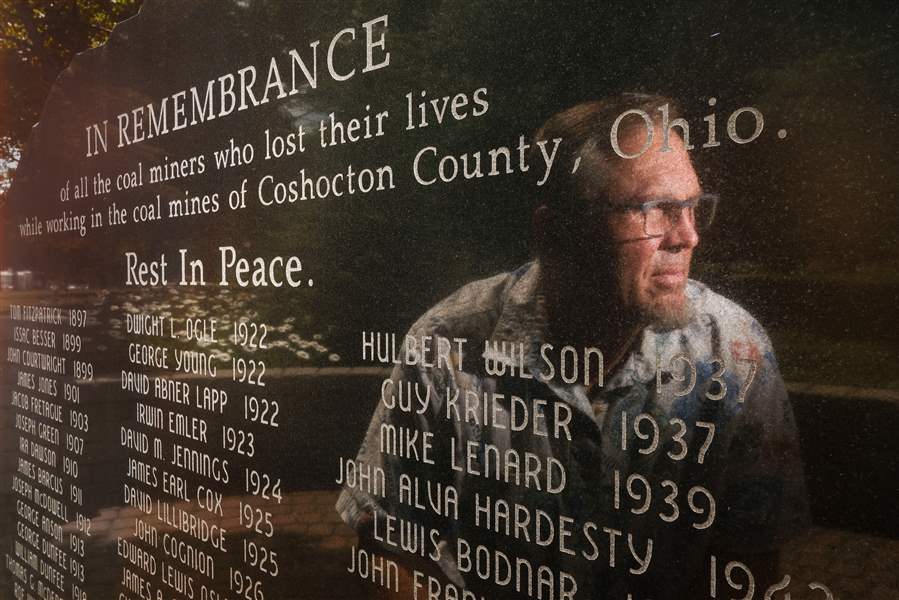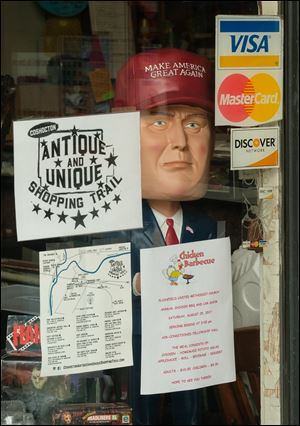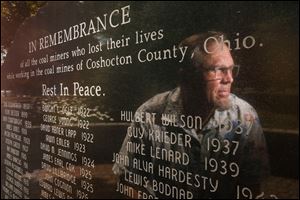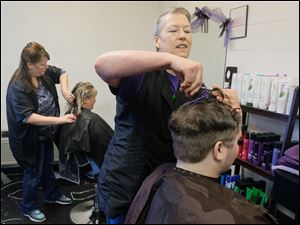
Support for President Trump remains high in tiny Coshocton, Ohio
9/2/2018
Sam Bennett is reflected in a Coal Miners Memorial in Coshocton. Mr. Bennett raised $60,000 and had the memorial installed on the lawn of Coshocton County Courthouse in 2013.
THE BLADE/JEREMY WADSWORTH
Buy This Image
COSHOCTON, Ohio — These days, three souls bring Sam Bennett hope — his wife, Debbie; God, and President Trump.
Like most of his neighbors in Coshocton — population 11,000 — Mr. Bennett hasn’t once looked back since voting for Mr. Trump in 2016.
Mr. Bennett is a soft-spoken man of 60 with close-set eyes and an easy smile, devoted to Christ and the collection of mining artifacts in his kitchen. The support he showed Mr. Trump at the voting booth remained unshaken through the Stormy Daniels fiasco and the recent outcry over family separations — two moments when, Mr. Bennett allows, Mr. Trump may have forgotten his Christian values.
Hopefully, Mr. Bennett said, Vice President Mike Pence, an evangelical Christian, will rub off on the president. Either way, Mr. Bennett will vote for Mr. Trump again in 2020, no question — a certainty echoed by nearly two dozen other Coshocton residents interviewed by The Blade.
RELATED: It's all about perspective
Many here perceive in the president a desire to “give back.” Some wished he wouldn’t tweet so much. Others described a kind of statute of limitations for public officials — the idea that what a person does or says before they enter office shouldn’t matter afterward.
But the majority could agree on one point: that Mr. Trump is a good president.
“A lot of people don't like him,” Mr. Bennett said. “But you know, America is sinking pretty fast, and you got to grab back and hold. Make yourself great again.”
A sinking feeling

A large Donald Trump bobblehead on display at the Coshocton Antique Mall.
That sinking feeling is common in Coshocton, an Appalachian town in east-central Ohio ravaged by drugs — meth and opioids, mostly — nostalgic for coal, stripped of industry.
In its prime, Coshocton bustled with factory workers and attracted families from out of state, like Mr. Bennett’s, drawn by the allure of industry jobs that paid much more than the minimum wage. But today, the city’s stately architecture hints at a grandeur that seems at odds with the vacant storefronts dotting the downtown.
Devoted residents described festivals held downtown on summer Fridays, where local tradesman set up shop on street corners to sell their wares. Just a few blocks from Main Street, though, are the rows of dilapidated houses and hulks of abandoned warehouses that show the city’s cracks.
Coshocton County’s unemployment rate hit 6.6 percent in July, 2018, above the statewide average of 4.6 percent, according to the Ohio Department of Job and Family Services. In 2016, the county went decisively for Mr. Trump, who took nearly 70 percent of the vote, totaling 10,381 votes to Hillary Clinton’s 3,908. In the Republican primary, Mr. Trump defeated Gov. John Kasich by 128 votes in Coshocton County, though Mr. Kasich won the statewide vote by about 11 percentage points.
City Councilman Chad Johnson, a Democrat, said he hasn’t seen concrete improvement in town since Mr. Trump took office.
“I don’t see it as much as I would like to see it,” he said. “I don’t think the town is growing the way it should grow, the way it could grow.”
Trump supporters who agreed faulted what they consider Democratic obstructionism. Others contended they had seen positive change, like Mr. Bennett, who said he’d heard talk that an executive order prevented massive layoffs at a local power plant. He’d even heard from an uncle in Kentucky that mines had started opening back up there.
“Those opening back up, speeding back up,” he said, “everything feeds off of that.”
Mines closed, missed

Sam Bennett is reflected in a Coal Miners Memorial in Coshocton. Mr. Bennett raised $60,000 and had the memorial installed on the lawn of Coshocton County Courthouse in 2013.
Mr. Bennett, in particular, has a personal history tied to the interests that helped hand Mr. Trump the presidency — among them, coal.
“He made a promise,” Mr. Bennett said of Mr. Trump, “and coal is a big part of that. There’s got to be a balance ... where you got enough clean air so that miners, men and women, can go to work and mine the coal, make the money, work a job.”
Mr. Bennett spent his early childhood in a coal camp in Harlan, Ky., where mining families could buy groceries with their wages in company coins and end up never turning much of a profit. If the mine black-listed you for complaining, “you had to move halfway across state get another job,” Mr. Bennett recalled, “so you kept your mouth shut.”
When Mr. Bennett was 6, his father scored a union job further north and eventually landed in Coshocton, where Mr. Bennett would spend the rest of his life.
His father died in a mining accident in 1971, when Mr. Bennett was in junior high. That marked the beginning of bad luck for Mr. Bennett, the start of a chain of losses — of family, jobs — that still brings him to tears mid-sentence. In 2011, after working in a local mine for 5 years and then at Coshocton’s now-defunct paper mill, Mr. Bennett’s first wife was hospitalized for stage-four cancer. Two months later, she was dead. Two years after that, the WestRock paper mill, which supplied some 200 jobs to the local community, shut down, and Mr. Bennett lost his job inspecting equipment. All the mines, save one, are gone. Now he works at Jones Metal, where he makes half what he used to.
As Mr. Bennett’s luck turned down, so did Coshocton’s. The General Electric Plant closed, then the paper mill. Because the city stopped processing water for the mill, the WestRock closing created a $1.2 million shortfall in annual revenues and a 34-percent rise in water rates. “It almost killed Coshocton,” Mr. Bennett said. Other big job suppliers closed, too — Lancaster Colony, Pretty Products, Shaw-Barton, Edmont, the list goes on — leaving behind shuttered warehouses or nothing at all.
Aging population, troubled youth
Meanwhile, more young people started leaving or shooting up — one reason why employers struggle to find workers sober enough to hold a job. Over the past year, the quality of meth, Coshocton’s drug of choice, has inexplicably skyrocketed, EMS Director Todd Shroyer said. Last winter, paramedics found a young man — the son of a former colleague of Mr. Shroyer’s — out in the snow, wearing just his underwear, and high on meth. One time, an addict stayed awake for a week straight.
“You'll have someone that you know, 18, 19-year-old, graduate from high school — you know, a young, attractive person — and then five years later they look like they're 60,” Mr. Shroyer said. “They've lost most of their teeth, they’re covered in sores. It's horrible.”
The drug problem hasn’t just affected the economy. It has hurt morale, and it contributed to the frustration with the status quo that Mr. Shroyer, who voted for Mr. Trump, credits with winning the celebrity businessman the election.
“I really think in this area, it was a lot of a frustration vote. It really was,” he said. “But you know, I can't honestly say that Trump's made a difference.”
Mr. Shroyer’s father, a lifelong Democrat, is an avid Trump supporter and voted Republican for the first time in his life in 2016. But Mr. Shroyer — who usually votes Republican, in his grandfather’s footsteps — thinks of his own vote as not pro-Trump, but anti-Clinton.
He’s waiting to survey the 2020 field to make his next decision, making him a relative outlier in a community where, as a general rule, those who voted for Trump once plan on doing it again.
‘A shoo-in’

Connie Ludwig, front, and Charlene Hixon cut the hair of Alex Ogle and Betsy Shaffer, respectively, at Sensational Styles in Coshocton.
The hairdressers at Sensational Styles learned plenty in beauty school, but one lesson stuck with them more than most: Never talk politics with customers.
“You do not talk about race, religion, or politics,” said Charlene Hixon, 50, who has been cutting hair for three decades and living in Coshocton for five.
“Or sex,” said Connie Ludwig, 54.
Mrs. Hixon, Mrs. Ludwig, and Jessica Horn, 43, all voted for Trump in 2016. Mrs. Hixon and Mrs. Horn don’t follow politics as closely as Mrs. Ludwig — the most outspoken of the three — but they all feel strongly about their president. Although they have some reservations about how he treats women — “He’s a jerk, how he comes across, especially towards women,” Mrs. Hixon said, to which Mrs. Ludwig replied, “No different than any other man” — they believe he’s doing what’s best for the country and would be doing more if Democrats would stop fighting him. At bottom, they excuse what look like moral failings because, Mrs. Horn said, “How many people know what really goes on?”
Mrs. Hixon, a registered Democrat, said she regrets voting for President Obama in 2008. She said she probably would vote for Mr. Trump again in 2020, although she’s not sure he’ll win.
“You hear a lot more people against him than for him, sometimes,” she said.
Unlike the hairdressers, the barber next door, Lenny Fowler — a bear of a man with a well-groomed goatee and a “Make America Great Again” cap always within reach — didn’t go to beauty school. And he’s sure about a lot of things. As he gave a buzz cut, he claimed that Islam isn’t a religion, that Mr. Obama doesn’t count as black because his mother was white, and that those pictures of crying children separated from their parents at the border are “fake news.” Most of all, he’s certain Mr. Trump will be victorious again in 2020.
So is Bruce Adams, a former police chief who now works as security director at Woodbury Outfitters, a shooting and hunting shop in town. What it comes down to, for him, is people. Mr. Adams doesn’t feel like he has much in common with “coastal elites,” the rich Californians and New Yorkers — with the exception of the rich New Yorker President — who don’t know what it’s like to live in a place like Coshocton.
“If you really look at what’s going on in New York, California, those people are so different,” he said. “They really are. But all of us who are in the center of all that are the ones who are going to get, and have got, him elected.”
Of Californians and New Yorkers, he said, “Money’s ruined ‘em.”
Of Mr. Trump’s performance in the 2020 election?
“I think it’ll be a shoo-in.”